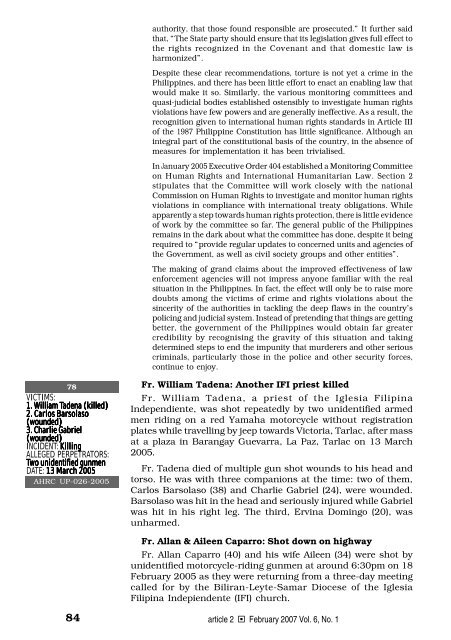of the Philippines the criminal justice system is - Article 2
of the Philippines the criminal justice system is - Article 2
of the Philippines the criminal justice system is - Article 2
You also want an ePaper? Increase the reach of your titles
YUMPU automatically turns print PDFs into web optimized ePapers that Google loves.
authority, that those found responsible are prosecuted.” It fur<strong>the</strong>r said<br />
that, “The State party should ensure that its leg<strong>is</strong>lation gives full effect to<br />
<strong>the</strong> rights recognized in <strong>the</strong> Covenant and that domestic law <strong>is</strong><br />
harmonized”.<br />
Despite <strong>the</strong>se clear recommendations, torture <strong>is</strong> not yet a crime in <strong>the</strong><br />
<strong>Philippines</strong>, and <strong>the</strong>re has been little effort to enact an enabling law that<br />
would make it so. Similarly, <strong>the</strong> various monitoring committees and<br />
quasi-judicial bodies establ<strong>is</strong>hed ostensibly to investigate human rights<br />
violations have few powers and are generally ineffective. As a result, <strong>the</strong><br />
recognition given to international human rights standards in <strong>Article</strong> III<br />
<strong>of</strong> <strong>the</strong> 1987 Philippine Constitution has little significance. Although an<br />
integral part <strong>of</strong> <strong>the</strong> constitutional bas<strong>is</strong> <strong>of</strong> <strong>the</strong> country, in <strong>the</strong> absence <strong>of</strong><br />
measures for implementation it has been trivial<strong>is</strong>ed.<br />
In January 2005 Executive Order 404 establ<strong>is</strong>hed a Monitoring Committee<br />
on Human Rights and International Humanitarian Law. Section 2<br />
stipulates that <strong>the</strong> Committee will work closely with <strong>the</strong> national<br />
Comm<strong>is</strong>sion on Human Rights to investigate and monitor human rights<br />
violations in compliance with international treaty obligations. While<br />
apparently a step towards human rights protection, <strong>the</strong>re <strong>is</strong> little evidence<br />
<strong>of</strong> work by <strong>the</strong> committee so far. The general public <strong>of</strong> <strong>the</strong> <strong>Philippines</strong><br />
remains in <strong>the</strong> dark about what <strong>the</strong> committee has done, despite it being<br />
required to “provide regular updates to concerned units and agencies <strong>of</strong><br />
<strong>the</strong> Government, as well as civil society groups and o<strong>the</strong>r entities”.<br />
The making <strong>of</strong> grand claims about <strong>the</strong> improved effectiveness <strong>of</strong> law<br />
enforcement agencies will not impress anyone familiar with <strong>the</strong> real<br />
situation in <strong>the</strong> <strong>Philippines</strong>. In fact, <strong>the</strong> effect will only be to ra<strong>is</strong>e more<br />
doubts among <strong>the</strong> victims <strong>of</strong> crime and rights violations about <strong>the</strong><br />
sincerity <strong>of</strong> <strong>the</strong> authorities in tackling <strong>the</strong> deep flaws in <strong>the</strong> country’s<br />
policing and judicial <strong>system</strong>. Instead <strong>of</strong> pretending that things are getting<br />
better, <strong>the</strong> government <strong>of</strong> <strong>the</strong> <strong>Philippines</strong> would obtain far greater<br />
credibility by recogn<strong>is</strong>ing <strong>the</strong> gravity <strong>of</strong> th<strong>is</strong> situation and taking<br />
determined steps to end <strong>the</strong> impunity that murderers and o<strong>the</strong>r serious<br />
<strong>criminal</strong>s, particularly those in <strong>the</strong> police and o<strong>the</strong>r security forces,<br />
continue to enjoy.<br />
78<br />
VICTIMS:<br />
1. William Tadena (killed)<br />
2. Carlos Barsolaso<br />
(wounded)<br />
3. Charlie Gabriel<br />
(wounded)<br />
INCIDENT: Killing<br />
ALLEGED PERPETRATORS:<br />
Two unidentified gunmen<br />
DATE: 13 March 2005<br />
AHRC UP-026-2005<br />
Fr. William Tadena: Ano<strong>the</strong>r IFI priest killed<br />
Fr. William Tadena, a priest <strong>of</strong> <strong>the</strong> Iglesia Filipina<br />
Independiente, was shot repeatedly by two unidentified armed<br />
men riding on a red Yamaha motorcycle without reg<strong>is</strong>tration<br />
plates while travelling by jeep towards Victoria, Tarlac, after mass<br />
at a plaza in Barangay Guevarra, La Paz, Tarlac on 13 March<br />
2005.<br />
Fr. Tadena died <strong>of</strong> multiple gun shot wounds to h<strong>is</strong> head and<br />
torso. He was with three companions at <strong>the</strong> time: two <strong>of</strong> <strong>the</strong>m,<br />
Carlos Barsolaso (38) and Charlie Gabriel (24), were wounded.<br />
Barsolaso was hit in <strong>the</strong> head and seriously injured while Gabriel<br />
was hit in h<strong>is</strong> right leg. The third, Ervina Domingo (20), was<br />
unharmed.<br />
Fr. Allan & Aileen Caparro: Shot down on highway<br />
Fr. Allan Caparro (40) and h<strong>is</strong> wife Aileen (34) were shot by<br />
unidentified motorcycle-riding gunmen at around 6:30pm on 18<br />
February 2005 as <strong>the</strong>y were returning from a three-day meeting<br />
called for by <strong>the</strong> Biliran-Leyte-Samar Diocese <strong>of</strong> <strong>the</strong> Iglesia<br />
Filipina Indepiendente (IFI) church.<br />
84<br />
article 2 • February 2007 Vol. 6, No. 1

















